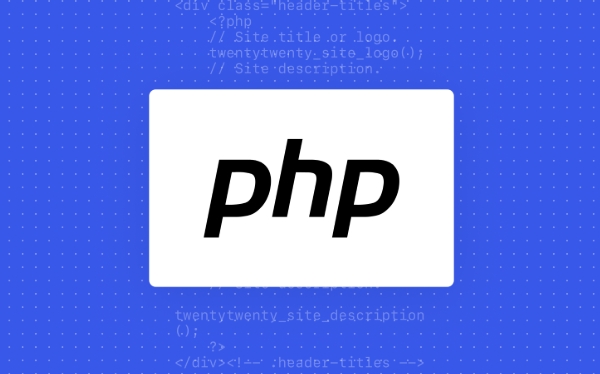 Backend Development
Backend Development
 PHP Tutorial
PHP Tutorial
 Achieving Type Safety with PHP Class Constants and Enumerations
Achieving Type Safety with PHP Class Constants and Enumerations
Achieving Type Safety with PHP Class Constants and Enumerations
Jul 30, 2025 am 01:23 AMPHP 8.1 enums provide true type safety over class constants by enabling native type hints and compile-time validation. 1. Class constants lack type enforcement, allowing invalid strings to be passed. 2. Pure and backed enums (e.g., enum OrderStatus: string) ensure only valid cases are accepted, preventing type errors. 3. Use backed enums for database/API mapping, pure enums for state flags. 4. Apply best practices: strict typing, match expressions for exhaustive handling, and tryFrom() for safe input validation. 5. Enhance enums with attributes to attach metadata like labels. Migrating from constants to enums improves code safety, readability, and IDE support, making them ideal for fixed value sets like statuses or roles.

PHP has evolved significantly in recent years, and with the introduction of features like class constants, backed and pure enumerations (as of PHP 8.1), developers now have powerful tools to enforce type safety—especially when dealing with fixed sets of values. This is crucial for reducing bugs, improving code readability, and enabling better IDE support and static analysis.

Here’s how you can leverage class constants and enumerations effectively to achieve type safety in modern PHP applications.
1. Using Class Constants for Type Safety (Pre-PHP 8.1 Approach)
Before enums were introduced, a common pattern was to define related constants in a class and pair them with type hints or validation.

class OrderStatus
{
public const PENDING = 'pending';
public const SHIPPED = 'shipped';
public const DELIVERED = 'delivered';
public const CANCELLED = 'cancelled';
}You could then use these constants across your application:
function updateStatus(string $status): void
{
if (!in_array($status, [
OrderStatus::PENDING,
OrderStatus::SHIPPED,
OrderStatus::DELIVERED,
OrderStatus::CANCELLED,
], true)) {
throw new InvalidArgumentException('Invalid status');
}
// Proceed with update
}Limitations:

- No native type constraint:
$statusis still just astring. - No compile-time validation.
- Easy to pass arbitrary strings that aren’t part of the allowed set.
This approach improves consistency but doesn’t provide real type safety at the language level.
2. Enums in PHP 8.1 : True Type Safety
With PHP 8.1, enumerations were introduced, allowing you to define a fixed set of named values with actual types.
Basic (Pure) Enum
enum OrderStatus: string
{
case PENDING = 'pending';
case SHIPPED = 'shipped';
case DELIVERED = 'delivered';
case CANCELLED = 'cancelled';
}Now you can type-hint directly using the enum:
function updateStatus(OrderStatus $status): void
{
// $status is guaranteed to be one of the defined cases
echo "Updating to: " . $status->value;
}Usage:
updateStatus(OrderStatus::SHIPPED); // ? Correct
updateStatus('shipped'); // ? TypeError: Expected OrderStatus, got stringThis is true type safety: only valid enum cases can be passed.
Backed Enums for Scalar Mapping
The OrderStatus above is a backed enum (it has a : string backing type), meaning each case maps to a scalar value. You can also create pure enums without a backing value (useful for state-like flags):
enum Priority
{
case LOW;
case MEDIUM;
case HIGH;
}Even without scalar values, you still get type safety when passing Priority::HIGH, etc.
3. Best Practices for Type-Safe Code with Enums
To fully benefit from enums and avoid common pitfalls:
- ? Always use enums over string/int constants when representing a fixed set of options.
- ? Prefer backed enums when you need to persist values (e.g., in a database or API).
- ? Use strict typing (
declare(strict_types=1);) to ensure type checks are enforced. - ? Leverage match expressions for safe, exhaustive handling:
function getStatusLabel(OrderStatus $status): string
{
return match ($status) {
OrderStatus::PENDING => 'Awaiting shipment',
OrderStatus::SHIPPED => 'On the way',
OrderStatus::DELIVERED => 'Delivered',
OrderStatus::CANCELLED => 'Order cancelled',
};
}- ? Validate input early when hydrating from external sources:
$status = OrderStatus::tryFrom($_POST['status'])
?? throw new InvalidArgumentException('Invalid status');4. Combining Enums with Attributes (PHP 8 ) for Metadata
You can enhance enums with attributes to attach metadata (e.g., labels, colors, permissions):
#[Attribute]
class Label
{
public function __construct(public string $text) { }
}
enum Priority
{
#[Label('Low Priority')]
case LOW;
#[Label('Medium Priority')]
case MEDIUM;
#[Label('High Priority')]
case HIGH;
public function label(): string
{
$reflector = new \ReflectionEnumCase(self::class, $this->name);
$attribute = $reflector->getAttributes(Label::class)[0] ?? null;
return $attribute?->newInstance()->text ?? $this->name;
}
}Now Priority::HIGH->label() returns 'High Priority'.
Final Thoughts
While class constants helped organize values, they lacked real type enforcement. Enums in PHP 8.1 close that gap, offering:
- Compile-time (or runtime) type safety
- Exhaustive case handling via
match - Interoperability with databases and APIs via
->value - IDE autocompletion and refactoring support
For new projects, favor enums over class constants whenever you're modeling a finite set of options. The result is cleaner, safer, and more maintainable code.
Basically, if you're still using string constants for statuses, roles, or types—consider upgrading to enums. It's not just a syntax improvement; it's a real step toward robust, self-documenting PHP.
The above is the detailed content of Achieving Type Safety with PHP Class Constants and Enumerations. For more information, please follow other related articles on the PHP Chinese website!

Hot AI Tools

Undress AI Tool
Undress images for free

Undresser.AI Undress
AI-powered app for creating realistic nude photos

AI Clothes Remover
Online AI tool for removing clothes from photos.

Clothoff.io
AI clothes remover

Video Face Swap
Swap faces in any video effortlessly with our completely free AI face swap tool!

Hot Article

Hot Tools

Notepad++7.3.1
Easy-to-use and free code editor

SublimeText3 Chinese version
Chinese version, very easy to use

Zend Studio 13.0.1
Powerful PHP integrated development environment

Dreamweaver CS6
Visual web development tools

SublimeText3 Mac version
God-level code editing software (SublimeText3)

Hot Topics
 Understanding Constant Expression Evaluation in PHP's Engine
Jul 29, 2025 am 05:02 AM
Understanding Constant Expression Evaluation in PHP's Engine
Jul 29, 2025 am 05:02 AM
PHPevaluatesconstantexpressionsatcompiletimetoimproveperformanceandenableearlyerrordetection.1.Constantexpressionevaluationmeanscomputingvaluesduringcompilationwhenalloperandsareknownconstantslikeliterals,classconstants,orpredefinedconstants.2.PHP’se
 Namespacing and Constants: Avoiding Collisions in Large-Scale Projects
Jul 30, 2025 am 05:35 AM
Namespacing and Constants: Avoiding Collisions in Large-Scale Projects
Jul 30, 2025 am 05:35 AM
Namespacingpreventsconstantcollisionsinlarge-scalesoftwareprojectsbygroupingrelatedconstantswithinuniquescopes.1)Constants,whichshouldremainunchangedduringruntime,cancausenamingconflictswhendefinedglobally,asdifferentmodulesorlibrariesmayusethesamena
 The Performance Paradigm: Analyzing the Speed of Constants vs. Variables
Jul 30, 2025 am 05:41 AM
The Performance Paradigm: Analyzing the Speed of Constants vs. Variables
Jul 30, 2025 am 05:41 AM
?Yes,constantsarefasterthanvariablesincompiledlanguagesduetocompile-timeevaluationandinlining.1.Constantsareevaluatedatcompiletime,enablingvalueinlining,constantfolding,andeliminationofmemoryallocation,whilevariablesrequireruntimeresolutionandmemorya
 Unveiling the Behavior of Constants within PHP Traits and Inheritance
Jul 29, 2025 am 03:58 AM
Unveiling the Behavior of Constants within PHP Traits and Inheritance
Jul 29, 2025 am 03:58 AM
PHPdoesnotallowconstantredeclarationbetweentraitsandclasses,resultinginafatalerrorwhenduplicateconstantnamesoccuracrosstraits,parentclasses,orchildclasses;1)constantsintraitsarecopieddirectlyintotheusingclassatcompiletime;2)ifaclassdefinesaconstantwi
 Demystifying PHP's Magic Constants for Context-Aware Applications
Jul 30, 2025 am 05:42 AM
Demystifying PHP's Magic Constants for Context-Aware Applications
Jul 30, 2025 am 05:42 AM
The seven magic constants of PHP are __LINE__, __FILE__, __DIR__, __FUNCTION__, __CLASS__, __TRAIT__, __METHOD__, and they can dynamically return code location and context information, 1. LINE returns the current line number, for precise debugging; 2. FILE returns the absolute path of the current file, often used to reliably introduce files or define root directory; 3. DIR returns the directory where the current file is located, which is clearer and more efficient than dirname (__FILE__); 4. FUNCTION returns the current function name, suitable for function-level log tracking; 5. CLASS returns the current class name (including namespace), in logs and factories
 Architecting with Immutability: Strategic Use of Constants in PHP
Jul 29, 2025 am 04:52 AM
Architecting with Immutability: Strategic Use of Constants in PHP
Jul 29, 2025 am 04:52 AM
ConstantsshouldbeusedtoenforceimmutabilityinPHPforbettercodeclarityandsafety;1)useconstantsforconfigurationanddomainlogiclikestatuscodesorAPIendpointstoavoidmagicvalues;2)preferclassorinterface-scopedconstantsoverglobalonestoimprovenamespacinganddisc
 `define()` vs. `const`: A Deep Dive into PHP Constant Declaration
Jul 30, 2025 am 05:02 AM
`define()` vs. `const`: A Deep Dive into PHP Constant Declaration
Jul 30, 2025 am 05:02 AM
Use const first because it parses at compile time, has better performance and supports namespaces; 2. When you need to define constants in conditions and functions or use dynamic names, you must use define(); 3. Only const can be used to define constants in classes; 4. define() can dynamically define expressions and complete namespace strings at runtime; 5. Once both are defined, they cannot be modified, but define() can avoid repeated definitions through defined(), while const cannot be checked; 6. The const name must be literal and does not support variable interpolation. Therefore, const is suitable for fixed and explicit constants, define() is suitable for scenarios that require runtime logic or dynamic naming.
 PHP Enums: The Modern Successor to Traditional Constant Groups
Jul 30, 2025 am 04:44 AM
PHP Enums: The Modern Successor to Traditional Constant Groups
Jul 30, 2025 am 04:44 AM
PHPenumsarethemodern,saferalternativetotraditionalconstantgroups.1.Theyprovidetypesafety,preventinginvalidvalues.2.TheyenableIDEautocompletionandbettertoolingsupport.3.Theyarefirst-classtypesusableintypehintsandinstanceofchecks.4.Theyallowiterationvi





